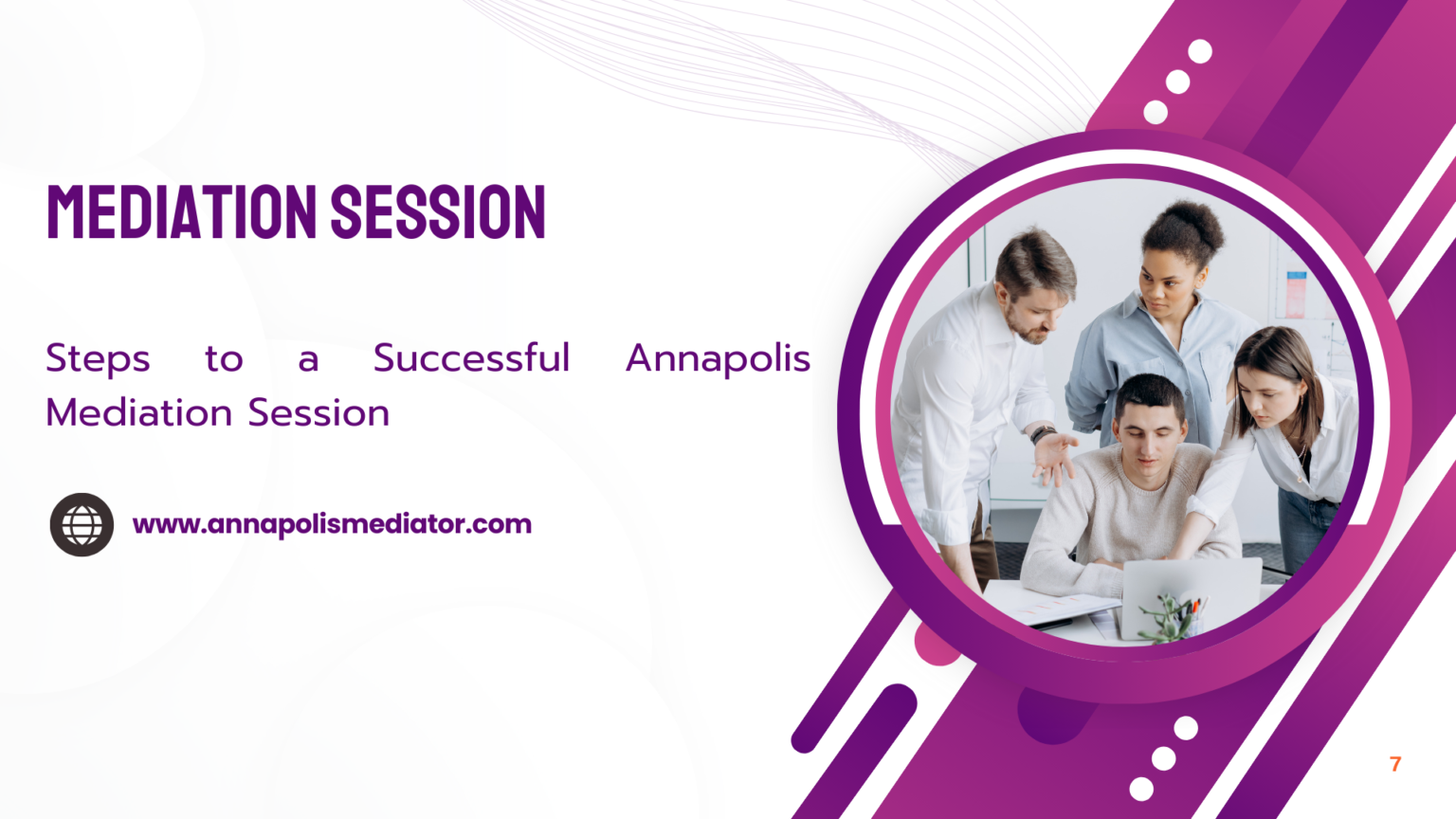Steps to a Successful Annapolis Mediation Session
Mediation is a powerful tool used to resolve conflicts in various settings, including family disputes, workplace disagreements, and legal matters. In Annapolis, mediation services are designed to help individuals and groups find solutions that work for all parties involved. The process involves a neutral third party, the mediator, who facilitates the conversation and ensures that all sides are heard. But for mediation to be effective, it requires careful preparation and a commitment to the process.
Here are the key steps to ensure a successful mediation session in Annapolis:
1. Understand the Mediation Process
Before entering mediation, it’s essential to understand the process. Mediation is a voluntary and confidential dispute resolution method. The mediator doesn’t take sides or offer legal advice but helps facilitate communication between the parties. In Annapolis, professional mediators help guide conversations so that participants can reach mutually beneficial agreements.
Understanding the mediation process is crucial to managing expectations. Mediation sessions are not about winning or losing; they focus on reaching a compromise that addresses the concerns of all parties involved.
2. Choose the Right Mediator
The success of mediation largely depends on the mediator’s experience and ability to remain neutral. When looking for an Annapolis mediator, it’s essential to consider the mediator’s background, experience with similar cases, and communication style. In Annapolis, mediators specialize in family, workplace, and civil mediation, so it’s important to select someone who understands the specific nature of your conflict.
A skilled mediator will create a safe and respectful environment where everyone feels heard. Their role is to guide the process, not impose solutions. They should have excellent listening skills and the ability to manage emotions during difficult conversations.
3. Prepare for the Session
Preparation is key to a successful mediation. Before the session, take some time to reflect on your goals and what you hope to achieve. Consider the following points:
List Your Concerns: Write down the issues that are causing conflict. This will help you focus on the key points during the session.
Identify Possible Solutions: Think about what kind of solutions might work for you. This can help when the mediator asks for potential compromises.
Be Ready to Listen: Mediation is not only about presenting your side. Be prepared to listen to the other party’s perspective without interrupting. This open-minded approach can lead to greater understanding and more productive discussions.
Consider Your Emotions: Mediators can help manage emotions, but being in the right frame of mind yourself is important. Try to approach mediation with a calm and open attitude.
In Annapolis, many mediators offer pre-session consultations where you can discuss your concerns and better prepare for the upcoming meeting. This can be a good opportunity to understand the mediator’s approach and how to navigate the session.
4. Be Open to Compromise
Mediation works best when both sides are willing to compromise. While it’s important to advocate for your needs and interests, it’s also essential to recognize that both parties may need to give and take. When you are willing to make concessions, you increase the chances of reaching a resolution that works for everyone.
Being open to compromise means finding solutions that address everyone’s needs. It’s often helpful to focus on long-term benefits rather than short-term wins. The goal is to come up with a solution that minimizes conflict and helps build a better relationship moving forward.
5. Focus on Communication
Effective communication is the cornerstone of successful mediation. In Annapolis, mediators are trained to create an environment where all parties can express themselves clearly and respectfully. Here are some tips for good communication during mediation:
- Use “I” Statements: Instead of blaming or accusing, focus on how you feel and what you need. For example, say, “I feel frustrated when…” instead of “You always…”
- Stay Calm: It’s natural for emotions to run high in conflict situations. But staying calm and composed will help you communicate more effectively and prevent the situation from escalating.
- Listen Actively: Pay close attention to what the other party is saying. Reflect back what you hear to ensure you understand their perspective.
- Avoid Interrupting: Give the other person time to speak before responding. Interrupting can create tension and prevent productive dialogue.
A skilled mediator will help ensure that communication remains respectful and productive. They’ll encourage each party to listen and speak in ways that foster understanding.
6. Work Toward a Win-Win Solution
The ultimate goal of any mediation session is to find a solution that works for all parties. While it may not always be possible to satisfy every single need, a good mediator will help guide you toward a solution that everyone can agree on. In Annapolis, mediators often employ techniques such as brainstorming and reframing to generate creative solutions that address the underlying needs of both parties.
A win-win solution doesn’t mean everyone gets exactly what they want, but it should be a fair compromise that helps everyone move forward. This requires flexibility and the willingness to work together.
7. Remain Patient
Mediation sessions can take time, especially if there are complex issues at play. It’s important to be patient throughout the process. The mediator will guide the conversation, but it may take multiple discussions before reaching an agreement. The key is to remain open-minded and persistent, even when the process feels slow.
In some cases, it may be necessary to schedule follow-up sessions to continue the discussions. Staying patient and flexible will ultimately lead to a more productive resolution.
8. Follow Through on Agreements
Once a resolution is reached, it’s crucial to follow through on any agreements made during the mediation. In Annapolis, mediators often help formalize the agreement in writing to ensure that both parties are clear on the terms. This written agreement may be legally binding, depending on the nature of the dispute.
Adhering to the terms of the agreement is essential for maintaining positive relationships. If one party fails to follow through, it can undermine the trust built during mediation. If issues arise after the session, returning to mediation can help resolve them quickly.
9. Review the Outcomes
After the mediation session, take time to review the outcomes and reflect on how the process went. Did you achieve your goals? Were you able to find a resolution that worked for everyone? This reflection can help you learn from the experience and improve your communication in future disputes.
In Annapolis, some mediators offer post-session support to help parties implement the agreements made during the session. This follow-up service can be particularly useful in family or workplace mediation where ongoing communication may be necessary.
10. Consider Mediation as an Ongoing Process
Mediation doesn’t always solve everything in one session. Sometimes, multiple sessions are required to reach a final resolution. Furthermore, the skills learned during mediation—such as effective communication and conflict resolution—can be applied in other areas of life. In Annapolis, many individuals and organizations use mediation not only to resolve current disputes but as a proactive tool for preventing future conflicts.
Mediation is an ongoing process that builds stronger relationships and improves collaboration. If the mediation process is successful, parties may be able to handle conflicts more constructively in the future.
Advertise Susan Saunders
If you’re looking for expert mediation services in Annapolis, consider reaching out to Susan Saunders. With years of experience and a compassionate, results-driven approach, Susan specializes in resolving family, workplace, and civil disputes. Her dedication to creating win-win solutions and her ability to build rapport with all parties involved make her an ideal choice for anyone seeking effective and lasting conflict resolution.
Contact Susan Saunders today to schedule your consultation and begin the journey toward resolving your disputes and building stronger relationships!


